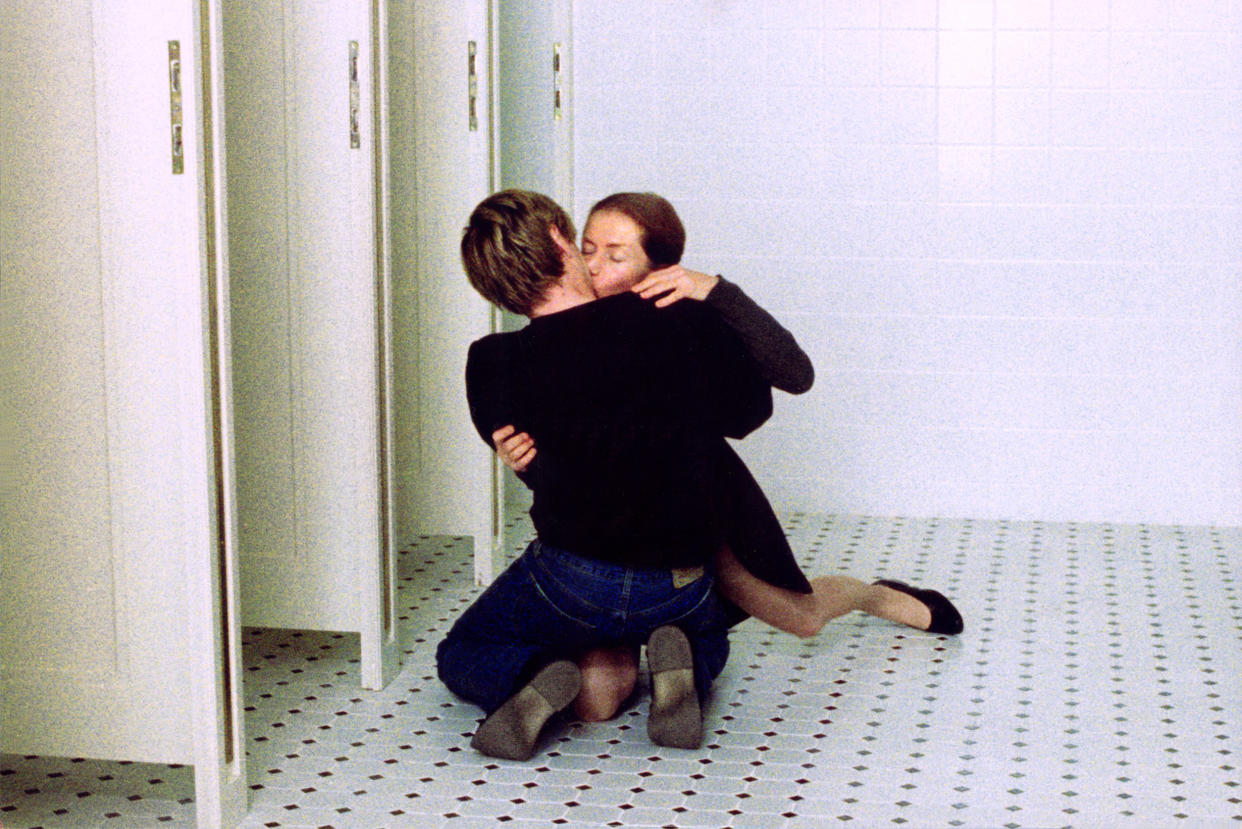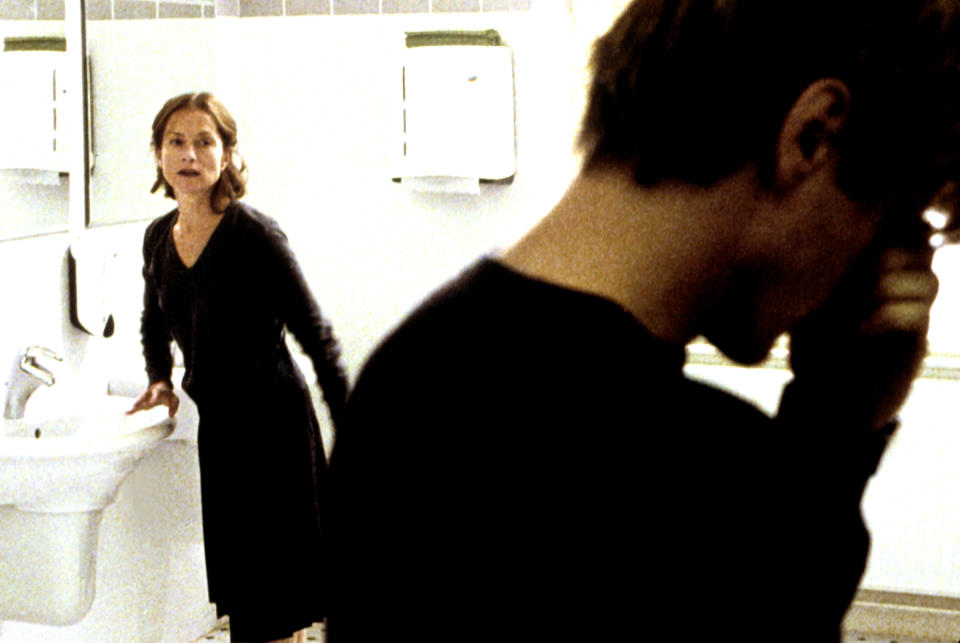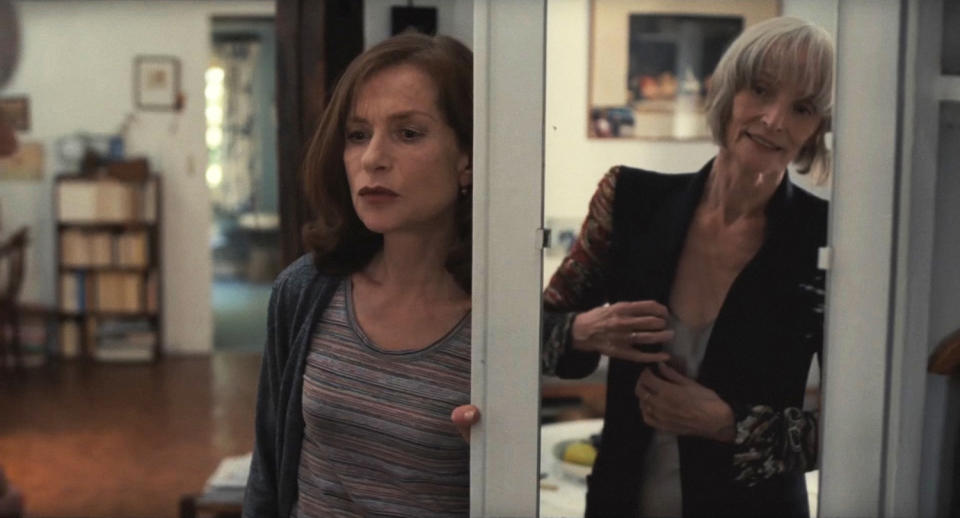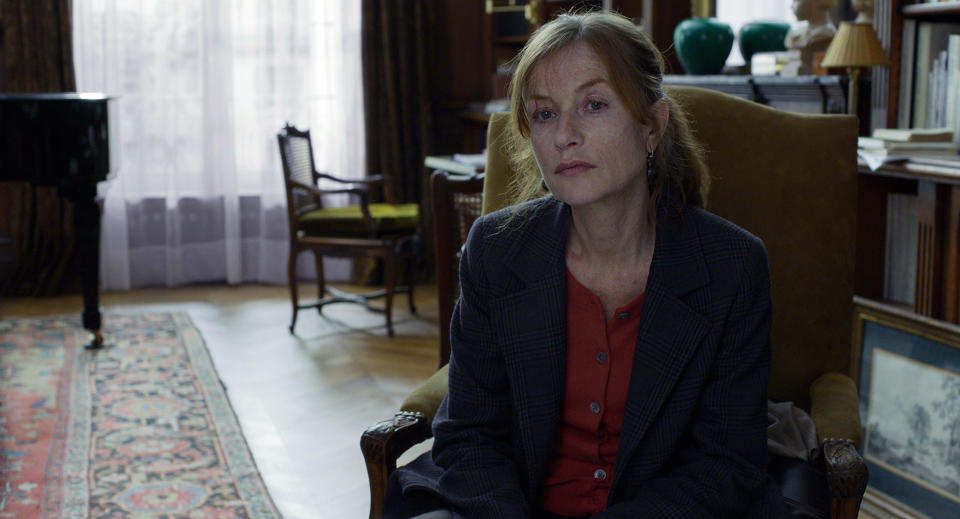Isabelle Huppert Looks Back on ‘The Piano Teacher’: ‘I Don’t Think Film Is Meant to Give Good Feelings’

- Oops!Something went wrong.Please try again later.
- Oops!Something went wrong.Please try again later.
- Oops!Something went wrong.Please try again later.
- Oops!Something went wrong.Please try again later.
- Oops!Something went wrong.Please try again later.
- Oops!Something went wrong.Please try again later.
- Oops!Something went wrong.Please try again later.
It’s almost midnight in Tokyo, where Isabelle Huppert is playing faded southern belle Amanda in a New National Theatre production of Tennesee Williams’ “The Glass Menagerie.” We’re on Zoom to discuss a new retrospective of her career opening at Film Forum this Friday. Her career needs no introduction, but it’s one so bursting with iconic, complicated, often gnarly characters — she has two Césars, five Lumières, a BAFTA, three Cannes honors, a Golden Globe, and an Oscar nomination — that to distill it all into 20 minutes of conversation with the French actress would be a fool’s effort. But one can try.
Instead of trying to parse what’s long made her so alluring to directors like Claude Chabrol (“La Ceremonie”), Jean-Luc Godard (“Every Man for Himself”), Michael Cimino (“Heaven’s Gate”), Maurice Pialat (“Loulou”), Ira Sachs (“Frankie”), Olivier Assayas (“Sentimental Destinies”), Paul Verhoeven (“Elle”), Claire Denis (“White Material”), and Hong Sangsoo (“In Another Country”), one movie may hold the key to her special genius: Michael Haneke’s 2001 “The Piano Teacher,” a film burrowed in the cold heart of many a sick cinephile.
More from IndieWire
Juliette Binoche, Isabelle Huppert, and Marion Cotillard Cut Their Hair for Iran Protest
'The Runner' Trailer: An Iranian New Wave Masterpiece Returns to Theaters
In the Austrian director’s icy, unhappy adaptation of Elfriede Jelinek’s novel, Huppert plays Erika, a piano teacher governed by dark desires and sick needs who takes up a sadomasochistic long game with her pupil (Benoît Magimel). Walter awakens in Erika a strange kind of love that brings her carefully managed, paraphilic existence crashing to the ground. The role won Huppert Best Actress at Cannes, and it’s one you can’t imagine any other actress playing or even attempting to take on. In it, she has a borderline-incestuous fixation on her mother, self-mutilates for sexual release, and terrorizes her students (putting shards of broken glass in the coat pockets of one she deems a rival). But Huppert is unafraid, and as she noted in our interview, she doesn’t “particularly like when people smile too much or are too happy onscreen.” That’s for sure.
She went on to star in Haneke’s “Time of the Wolf,” Best Picture-nominated “Amour,” and “Happy End,” but “The Piano Teacher” epitomizes the seemingly telepathic collaboration she has with the controversial maker of highbrow arthouse fare that has consistently challenged audiences. “The Piano Teacher” is among the vast lineup of Huppert titles rolling out at Film Forum through October, and you couldn’t go wrong with settling in for any one of them. No other living actress has so fully embraced and found empathy in the darkness, located the depraved inner core and perversity driving all her characters, whether flipping the script on a sexual assault narrative in “Elle” or finding new life after broken love in Mia Hansen-Løve’s gorgeous “Things to Come,” a movie tailor-made for her.
I spoke with Huppert about her wide-ranging career and dug into “The Piano Teacher” below.
This interview has been edited for clarity.
IndieWire: Looking at this retrospective, it’s easy to marvel at your huge body of work. When you look at these films, do you think, “Yes, I’m very satisfied. I’ve done so much”? Or do you feel like you’re still a work in progress?
Isabelle Huppert: I do hope I’m still a work in progress. That [retrospective] does not cover the majority of the films I did in my life. It’s a big selection, but it’s a selection. It’s interesting to think about your work, not in terms of quantity, but in terms of the variety of people I have been working with, that’s for sure. It covers films I’ve been doing in my country, in foreign countries, so it reflects the reality of what I’ve been doing, and for that I’m glad.

©Kino International/Courtesy Everett Collection
Going through the list of directors, even early in your career, you had one amazing collaborator after another, with Chabrol, Godard, Losey, Cimino. Starting out, did you want to deliberately make these kinds of connections with auteurs, or did it happen organically?
It happened. You have to have a theory about the nature of the directors you would like to work with, and in fact, yes, I’ve been doing more commercial films, and it was not a conscious reflection. It just happened. An actor or actress’ journey is made out of something you can’t predict. Some of the things you can sometimes provoke. Many of them you can’t predict. It’s a mixture of all the various conditions upon which things happen or not.
Your recent movies like “Frankie” with Ira Sachs, “Things to Come” with Mia Hansen-Løve, or “Elle” with Paul Verhoeven seem built around you. What is your process these days? Do you give a lot of notes on scripts, or do you just surrender to a director?
I don’t really surrender to the director. I surrender to the film. The film is a story of its own. Of course, it includes the director’s view, but it includes many other parameters, but that’s what cinema is made of. It’s a very, very concrete material, and each time when it starts, it’s made of an infinity of things. The camera movements, the costume, the script, the dialogues, and the director, but it includes so many little events, and that thing that I am always ready to welcome is something that you cannot really predict. If you take one of my scripts, I’m afraid you won’t find many notes. It’s all there. You have to think a lot about it. It might not be even a conscious process, but you just think, and it’s enough to connect you with what you have to do.

IFC Films/Courtesy Everett Collection
In many of my favorite movies of yours, your characters have an innate drive toward destruction, and you’re fearless in how you take these roles on. What’s driving you to dark places, or is it something you’re not conscious of that you just shrug off?
It’s certainly not out of being brave, because I don’t think you’d be brave to take these kinds of roles. These are usually the best roles, and I don’t think film is made to give good feelings. For me, it’s more made for exploring, yes, the dark, the good and the bad, and it’s just more interesting. It might not even be better or worse. It offers a bigger variety. As an actress, I don’t particularly like when people smile too much or are too happy onscreen. That doesn’t interest me. One of my favorite lines in my whole life as an actress is in “The Piano Teacher,” when she listens to her pupil, played by Benoît Magimel. He plays and then she sits and goes, “Does coldness mean something for you?” It’s a great line because by that she means no sentimentality. Just something more pure, more dry. I like this idea, in terms of aesthetic.
Michael Haneke said he would not do “The Piano Teacher” without you. Did it take convincing for you, or was the role an immediate “yes”?
Between Michael and me, it’s a non-story. The first offer was “Funny Games,” and I turned it down. I thought the film was brilliant, but when I first read the script, it was really, really difficult, because for “Funny Games,” it’s more like an experience to show how the violence was operating onscreen for the spectator, and how it was most of the time wrapped in some kind of a sweet something to make it acceptable by the audience. In “Funny Games,” there is no wrap. It was the dry experience of death and murder, so there was very little for the imaginative process. But later, he came to me for “Time of the Wolf,” which I dropped out of for various reasons, and I couldn’t do it. [“Time of the Wolf” later came together in 2003, two years after “The Piano Teacher.”] He finally came to me for “The Piano Teacher” and he was very stubborn and said, “Isabelle, this is my last time. I will never ask you again, and I won’t do the film [without you].” That was enough for me to do it, of course. He was very patient.

©Sony Pictures/Courtesy Everett Collection
Erika can be hard to read. She has a monochromatic expression, and when that starts to shatter, you know she’s unraveling. Other than reading the novel, what was your own private, internal process of preparing to play her?
Strangely enough, I never read the novel. Michael thought it was better if I didn’t. I still haven’t read it. It’s ridiculous. I’ve read many other books by Elfriede Jelinek but not “The Piano Teacher.” There was something very touching in the character. She has a very high idea of love, but she’s also a suffering woman. That was enough for me to make her be accepted and to love, but of course, really twisted, undoubtedly. Sometimes, the audience doesn’t know exactly the reasons why you are connected to a film. You can’t really analyze it, but it’s there, and in that case, there was something ideal, something very much in the feeling of love, the love concept was really elevated in the film. She puts love on such a high level, but obviously, she can’t reach it. That’s the problem. But it’s a good project in which to search for love in such an ethereal region of feeling.
Your 2017 Oscar nomination for “Elle” brought you a great deal of new visibility for western audiences. Did going through the awards season process change anything for you?
It was a wonderful journey and a wonderful time, but did it change something? I don’t know. You can’t say that there was anything different after. Nothing changed. I’ve always worked with the same kind of engagement with the directors, and it certainly didn’t change that. It was in the line of what I’ve always been doing since I’ve been an actress. Great roles, great directors, sometimes great success, sometimes great failure, but that’s the story of moviemaking.
Film Forum’s Isabelle Huppert retrospective starts this Friday.
Best of IndieWire
New Movies: Release Calendar for September 30, Plus Where to Watch the Latest Films
Martin Scorsese's Favorite Movies: 50 Films the Director Wants You to See
Sign up for Indiewire's Newsletter. For the latest news, follow us on Facebook, Twitter, and Instagram.

